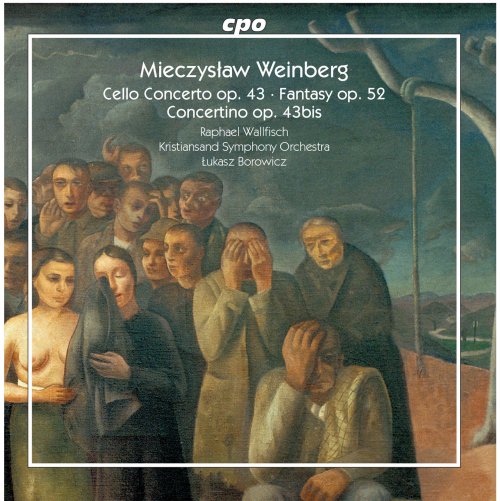
Raphael Wallfisch, Kristiansand Symphony Orchestra feat. Lukasz Borowicz - Weinberg: Works for Cello & Orchestra (2020)
- Title: Weinberg: Works for Cello & Orchestra
- Year Of Release: 2020
- Label: CPO
- Genre: Classical
- Quality: flac lossless +Booklet
- Total Time: 01:07:00
- Total Size: 278 mb
- WebSite: Album Preview
Tracklist
01. Cello Concerto, Op. 43: I. Adagio
02. Cello Concerto, Op. 43: II. Moderato
03. Cello Concerto, Op. 43: III. Allegro
04. Cello Concerto, Op. 43: IV. Allegro
05. Fantasy, Op. 52
06. Concertino, Op. 43bis: I. Adagio
07. Concertino, Op. 43bis: II. Moderato espressivo
08. Concertino, Op. 43bis: III. Allegro vivace
Mieczys³aw Weinberg grew up in Warsaw, a city in which Poles then accounted for two thirds of the populace and Jews for one third of its residents. The Jews increasingly regarded themselves as Poles, just as he did. The three works on this CD clearly attest to the fact that Weinberg felt that he belonged to both traditions. The Concertino and the Cello Concerto have Jewish roots, while the Fantasy is a piece with a typically Polish character. If the Concertino, in which the orchestra is extraordinarily sparingly used and the violoncello practically plays a solo, may be described as the composer’s »lyrical journal« in music notes, then the Cello Concerto derived from it has even more clearly been written for the grand stage. It is more fully developed, the work has assumed a new character, and the orchestra plays a more important role in it. These changes are apparent already in the first movement and become more and more clearly audible in the following movements. A new theme is sounded in the second movement, and the wind instruments imitate the sound of klezmer
groups. The third movement assumes a central significance and verges on a bravura piece without ever losing its popular character practically suggesting folk music. The soloist’s cadenza, here very much more clearly structured than in the Concertino, leads to the finale, which creates the impression of having been added to lend the music the prescribed »Soviet optimism.« However, when the theme from the first movement returns at the very end, this initially occurs with an admixture of pathos, then somewhat sentimentally – which situates this work very far from the intimate music
familiar to us from the Concertino.
01. Cello Concerto, Op. 43: I. Adagio
02. Cello Concerto, Op. 43: II. Moderato
03. Cello Concerto, Op. 43: III. Allegro
04. Cello Concerto, Op. 43: IV. Allegro
05. Fantasy, Op. 52
06. Concertino, Op. 43bis: I. Adagio
07. Concertino, Op. 43bis: II. Moderato espressivo
08. Concertino, Op. 43bis: III. Allegro vivace
Mieczys³aw Weinberg grew up in Warsaw, a city in which Poles then accounted for two thirds of the populace and Jews for one third of its residents. The Jews increasingly regarded themselves as Poles, just as he did. The three works on this CD clearly attest to the fact that Weinberg felt that he belonged to both traditions. The Concertino and the Cello Concerto have Jewish roots, while the Fantasy is a piece with a typically Polish character. If the Concertino, in which the orchestra is extraordinarily sparingly used and the violoncello practically plays a solo, may be described as the composer’s »lyrical journal« in music notes, then the Cello Concerto derived from it has even more clearly been written for the grand stage. It is more fully developed, the work has assumed a new character, and the orchestra plays a more important role in it. These changes are apparent already in the first movement and become more and more clearly audible in the following movements. A new theme is sounded in the second movement, and the wind instruments imitate the sound of klezmer
groups. The third movement assumes a central significance and verges on a bravura piece without ever losing its popular character practically suggesting folk music. The soloist’s cadenza, here very much more clearly structured than in the Concertino, leads to the finale, which creates the impression of having been added to lend the music the prescribed »Soviet optimism.« However, when the theme from the first movement returns at the very end, this initially occurs with an admixture of pathos, then somewhat sentimentally – which situates this work very far from the intimate music
familiar to us from the Concertino.
Year 2020 | Classical | FLAC / APE
As a ISRA.CLOUD's PREMIUM member you will have the following benefits:
- Unlimited high speed downloads
- Download directly without waiting time
- Unlimited parallel downloads
- Support for download accelerators
- No advertising
- Resume broken downloads


